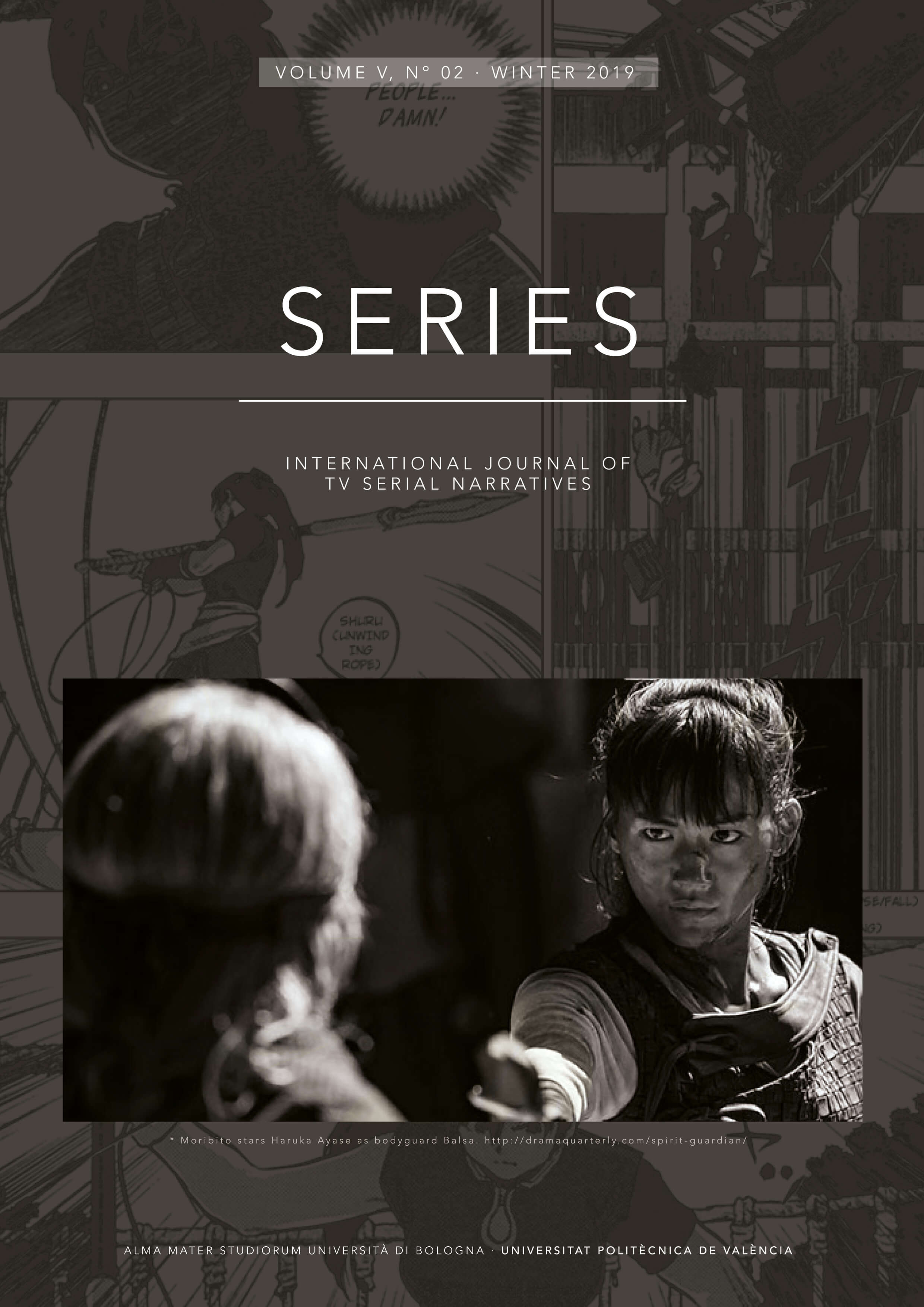The Viewing Mind and Live-Action Japanese Television Series: A Cognitive Perspective on Gender Constructions in Seirei no Moribito (Guardian of the Spirit)
DOI:
https://doi.org/10.6092/issn.2421-454X/9334Parole chiave:
Japanese television, gender, narrative strategies, cognitive processing, MoribitoAbstract
The recent (2016–2018) live-action Japanese television series, Seirei no Moribito (Guardian of the Spirit), was produced by NHK in the vein of the taiga (big river) historical drama, but challenges this and other Japanese generic conventions through its production as a fantasy series, and through its female heroine rather than the usual male samurai hero. This paper takes a cognitive narratological perspective in the exploration of how story-telling devices conjure and challenge some of the most dominant patriarchal scripts found across much of Asia (and elsewhere). It examines how narrative techniques prompt viewer mental processing with regard to cultural schemas and scripts of, for instance, male/female roles in family relationships, women’s participation in the employment sector, and marriage and childbearing. The examination thereby delves into important issues in the context of recent social discourse on gender roles in Japan. A close examination of the filmic strategies and devices which encourage audience engagement with the main female protagonist, Balsa, and her relationships casts light on the state of some of Japan’s changing attitudes on gender, workforce and family roles.
Riferimenti bibliografici
Alber, Jan, Caracciolo, Marco, Iversen, Stefan, Kukkonen, Karin, Skov Nielsen, and Henrik Skov Nielsen (2018) ‘Introduction: Unnatural and Cognitive Perspectives on Narrative (A Theory Crossover)’, Poetics Today 39 (3): 429–445.
Aso, Noriko (2010) ‘Revolutionary Girls: From Oscar to Utena’. Television, Japan, and Globalization, eds. Yoshimoto, Mitsuhiro, Tsai, Eva, and Choi, JungBong, Center for Japanese Studies, University of Michigan, Ann Arbor, MI. pp. 151–171.
Endo, Masafumi. (2016) ‘View from the East: NHK’s Masafumi Endo discusses success in Asia’, Drama Quarterly http://dramaquarterly.com/view-from-the-east/ [accessed 25 February 2019].
Enomoto Aki. (2007) ‘Shôsetsu 'chizu' ni “Moribito” shiriizu o sagasu’ [Exploring the genre of the novel in the ‘Moribito’ Series]. Eureka: shi to hihyô, 39.6: 217–225.
Garfield, J. L., Peterson, C. C., & Perry, T. (2001), ‘Social Cognition, Language Acquisition and the Development of the Theory of Mind’. Mind & Language, 16: 494-541.
Herman, David. (2002) Story Logic: Problems and Possibilities of Narrative. Lincoln: University of Nebraska Press.
–– (2013) “Cognitive Narratology” http://wikis.sub.uni-hamburg.de/lhn/index.php/Cognitive_Narratology [accessed 9 March 2019].
Ikezoe, Hirokuni (2014) ‘Work-life Balance in Japan: Outline of Policies, Legal Systems and Actual Situations’ Japan Labor Review, 11 (1): 108–124.
Itsuji Akemi (2006) ‘4-nin no Japanesuku neo fantajii joryû sakka-tachi: Ono Fuyumi o chûshin ni’ [Four Japaneseque Neo-fantasy female authors: Focussing on Ono Fuyumi]. Nihon Jidô Bungaku no Nagare, Kokuritsu Kokkai Toshokan Kokusai Kodomo Toshokan: 86–107.
Kido Noriko et al. (2007) ‘Uehashi Nahoko no Sakuhin Sekai’ [The World of Uehashi Nahoko’s Works]. Kodomo to Dokusha, 364: 2–16.
Lee, Sung-Ae, Tan, Fengxia, and John Stephens (2017), ‘Film Adaptation, Global Film Techniques and Cross-Cultural Viewing’ International Research in Children’s Literature 10 (1): 1–19.
Le Fèvre-Berthelot, Anaïs (2018) ‘Gossip Girl and the CW: Defining a New Network (You’re Nobody Until You’re Talked About)’, SERIES – International Journal of TV Serial Narratives 4 (2): 09–18. DOI: 10.6092/issn.2421-454X/8190
Mandujano-Salazar, Ysela. (2017) ’It is Not that I Can’t. It is that I Won’t: The Struggle of Japanese Women to Redefine Female Singlehood through Television Dramas’, Asian Studies Review, 41:4, 526-543. DOI: 10.1080/10357823.2017.1371113.
Michlin, Monica (2011) ‘More, More, More. Contemporary American TV Series and the Attractions and Challenges of Serialization As Ongoing Narrative’, Mise au point (online), 3 (2011). https://journals.openedition.org/map/927 DOI: 10.4000/map.927.
Mittell, Jason (2010) ‘Previously On: Prime Time Serials and the Mechanics of Memory’, in Intermediality and Storytelling, eds. Marina Grishakova and Marie-Laure Ryan. New York: De Gruyter: 78–98.
Orbaugh, Sharalyn (2003) ‘Busty Battlin’ Babes: the Evolution of the Shôjo in 1990s Visual Culture’, in Gender and Power in the Japanese Visual Field, eds. Norman Bryson, Maribeth Graybill, and Joshua Mostow. Honolulu: Hawai’i University Press, 2003: 200-228.
Pickard, Michael (2017) ‘Spirit guardian’, Drama Quarterly, http://dramaquarterly.com/spirit-guardian/ [accessed 16 February 2019].
Prindle, Tamae (2016) Women in Japanese cinema: alternative perspectives. Portland, Maine: Merwin Asia.
Richardson, Alan, and Francis F. Steen (2002) ‘Literature and the Cognitive Revolution’, Poetics Today (Special issue), 23 (1): 1–8.
Shim, Hongjin, Jung, Lim Sohye, Eunjean, Elizabeth, and Euikyung Shin (2018) ‘I hate binge-watching but I can’t help doing it: The moderating effect of immediate gratification and need for cognition on binge-watching attitude-behavior relation’, Telematics and Informatics 35, 7: 1971-1979. https://doi.org/10.1016/j.tele.2018.07.001.
Stephens, John (forthcoming) ‘Subjectivity, Theory of Mind, and the Creation of Deaf Characters in Fiction’, in Children and Deaf Culture in Literature and Other Modes of
Representation [Working title], eds. Vivian Ycnika-Agbaw and John Stephens. Jackson: University Press of Mississippi.
Tennant, Ella (2017) ‘Ol’ Man River – how gendered language shapes the way we see the world’ The Conversation. https://theconversation.com/ol-man-river-how-gendered-language-shapes-the-way-we-see-the-world-87700 [accessed 7 March 2019].
White-Schwoch, Travis and Rapp, David. N. (2011) ‘Comprehending comics and Graphic Novels: Watchmen as a Case for Cognition’. SANE journal: Sequential Art Narrative in Education: Vol. 1 (2), Article 2.
Willemsen, Steven P. M. (2018). The Cognitive and Hermeneutic Dynamics of Complex Film Narratives. Groningen: University of Groningen.
Zunshine, Lisa (2006) Why We Read Fiction: Theory of Mind and the Novel. Columbus: The Ohio State University Press.
Downloads
Pubblicato
Come citare
Fascicolo
Sezione
Licenza
Copyright (c) 2019 Helen Claire Kilpatrick
La rivista è rilasciata sotto una licenza Creative Commons Attribuzione 4.0 Internazionale (licenza completa).
Vedere anche la nostra Open Access Policy.





